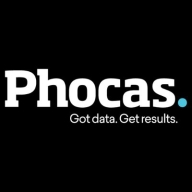

Teradata and Phocas are competing in data analytics and business intelligence. Phocas seems to have an edge due to its intuitive offerings, while Teradata is favored for its robust data management capabilities.
Features: Teradata provides scalable enterprise solutions, extensive data warehousing, and robust analytics. Phocas is known for user-friendly data visualization and reporting, aimed at small to medium businesses looking for straightforward analytics.
Ease of Deployment and Customer Service: Teradata requires significant infrastructure investment and technical expertise, resulting in longer setup times, with support tailored for enterprises. Phocas allows quick setup and integration, offering proactive support and accessible deployment for businesses with limited resources.
Pricing and ROI: Teradata's setup is more costly but offers substantial ROI for extensive data processing needs. Phocas presents an affordable entry point with flexible pricing, promising valuable insights and strong returns, especially for those prioritizing speedy deployment without high financial outlay.

Access, see and dive into the data that makes your business tick.
Of course, building your own useful dashboards and scorecards is straightforward but what really sets our business intelligence software apart is the ad hoc analysis layer, what we call the Grid. It’s here where you follow your train of thought to answer your own questions and inevitably uncover far-reaching business opportunities.
Teradata is a scalable data analytics platform designed to meet enterprise demands for large-scale data management and processing, focusing on performance, scalability, and security for complex query executions.
As a leading data warehousing solution, Teradata integrates advanced analytics enabling organizations to derive insights from massive datasets. It supports high-volume data workloads with its architecture optimized for analytical queries. Users benefit from its robust scalability, allowing seamless expansion as data grows. Teradata's SQL engine is compatible with a wide range of data types, ensuring flexibility in data analysis. With advanced security measures, it protects sensitive data across various environments, providing peace of mind to users handling critical information.
What are the most important features of Teradata?Teradata is widely used in industries like finance, telecommunications, and healthcare, where data-driven decisions are critical. Companies leverage its robust analytics capabilities to enhance customer experiences, streamline operations, and ensure compliance with regulatory requirements. In these sectors, quick access to data insights can significantly impact competitive advantage.
We monitor all BI (Business Intelligence) Tools reviews to prevent fraudulent reviews and keep review quality high. We do not post reviews by company employees or direct competitors. We validate each review for authenticity via cross-reference with LinkedIn, and personal follow-up with the reviewer when necessary.